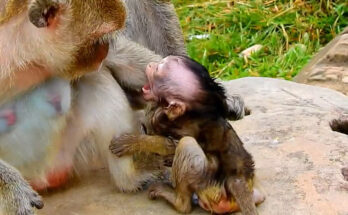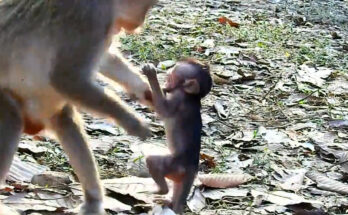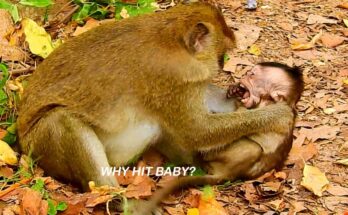
A heartbreaking scene unfolded deep in the forest canopy where a newborn baby monkey was left alone in a tree, only moments after birth. The tiny creature, still wet and trembling from entering the world, let out soft, helpless cries as it struggled to lift its fragile head. Sadly, its mother had wandered away, visibly exhausted and unable to care for her infant.
Mother monkeys usually display fierce devotion to their young, but sometimes, physical weakness and extreme fatigue overpower maternal instinct. In this case, the young mother had gone through a long, stressful labor without support or nourishment. Her body, drained of energy, could barely carry her own weight. As soon as the baby was born, she remained beside it for only a short while before climbing down the tree, possibly in search of food or simply because she lacked the strength to continue.
The baby, vulnerable and unaware of the danger around it, clung to a thin branch, calling for its mother with soft, desperate squeals. Other monkeys passed nearby but showed no interest, leaving the newborn isolated. Without warmth or milk, the infant’s chances of survival seemed tragically slim.
Such scenes highlight the raw and painful reality of life in the wild. While we often romanticize animal families, nature is often unforgiving—especially for the very young and the very weak. It’s a reminder of how vital a mother’s care is and how dangerous it can be when that bond is broken, even unintentionally.
Whether this baby monkey will be rescued by another member of the troop or perish in silence remains unknown. But its tiny cries etched a sorrowful image of how exhaustion and hardship can turn even the most natural love into an unreachable promise.


